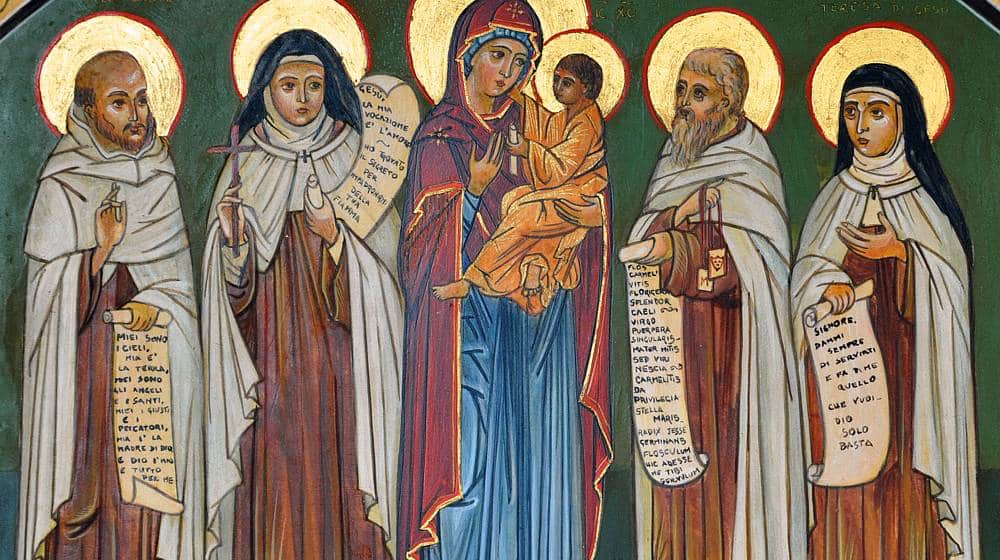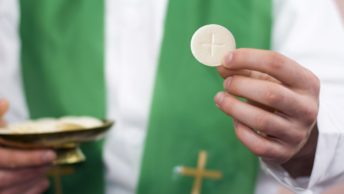Eldad and Medad were not in the tent when the Spirit of God came upon the 70 in the Book of Numbers (11:25-29). Eldad and Medad weren’t there, but they still received the Spirit and began to prophesize. “Stop them,” Joshua told Moses, “Why?” asked Moses. “Would that God’s Spirit come upon all the people.”
In the Gospel of Mark (9:38-43, 45, 47-48), the Disciples overstepped their bounds. A man who was not one of the Twelve was driving out demons in the name of Jesus. They tried to stop him. Jesus replied, “Don’t prevent him. There is no one who performs a mighty deed in my name who at the same time can speak ill of me. Whoever is not against us is for us.”
There is a huge difference between these two accounts and an incident that took place in Ephesus that is mentioned in the Acts of the Apostles. St. Paul had been in Ephesus for two years, preaching and healing in the name of Jesus Christ. Then itinerant exorcists came into the city. They were like the traveling medicine men of the Old West, selling snake oil that healed everyone’s woes……..for a price. When they learned how popular Paul had become, they saw a chance to make a profit using his name and Jesus’ name. It would be relatively simple since they knew that many people would be healed by the power of suggestion. The trouble is that they came upon the real thing, a man who was really suffering from demonic possession. These charlatans, the seven sons of Sceva, proclaimed over the man, “I adjure by the name of Jesus whom Paul preaches to come out of this man.” Well, the devil answered back from the man, “Jesus I know. Paul I know. But who are you?” I can imagine the seven guys looking at each other and saying, “This is not good. We are in big trouble.” Then the evil spirit leapt out of the man and possessed all seven of the phonies, who, according to Acts, ran away naked and wounded. It really is a funny story found in Acts 19:13-16.
What was the difference between this incident and the previous two? Eldad and Medad, and man healing in the name of Jesus, were all sincere. They had received God’s spirit and were caring for God’s people. The charlatans in Acts just wanted to make a buck on Jesus.
These three incidents bring me to consider two questions: First: how do we distinguish between those who are truly authentic Christians and those who are using Christ for money? And second: what should our relationship be with authentic Christians who are not Catholic?
The first question is easy. Jesus said, “By your fruits you will know them.” When we come upon someone who uses the name of Jesus for their own personal profit, that person is not an authentic Christian. An authentic Christian, including those within the Catholic Church, does not turn religion into a lucrative business. In the Catholic church we have many very intricate procedures for handling the people’s donations mandated by our dioceses, but if priests or church workers find a way to get around these, they have to answer to the civil law first for thievery, and, ultimately, they have, to paraphrase Desi Arnez in the old I Love Lucy Show, they have “some splainin to do……to God.” Most of the main stream non-Catholic churches, synagogues, and mosques have similar procedures to ensure that the people’s tithes are used properly, but this does not necessarily exist in churches independent of any organized structure. People need to watch and even investigate to see whether the goal of the ministry is truly Jesus Christ or is the accumulation of wealth in his name. “By their fruits you will know them.”
The second question is more difficult: What should our relationship be with authentic Christians who are not Catholic? In the past, we would say that our relationship should be cordial, but I find that insufficient. Here we have people who are determined to praise and worship Jesus Christ and to bring His Love to the poor of the world. It is not enough to say that we should be cordial. It sounds like we are tolerating each other, sort of being forced to put up with each other. No, we can and must do far more than that. We should support each other. We should pray together. And we should pray for each other. We Catholics should profoundly respect the call of non-Catholics to authentic discipleship. We should also respect the call of those who do not acknowledge Jesus Christ but who have received the Spirit of God.
We also should respect the call and gifts we have received within the Catholic Church. As Catholics we have been called into a Eucharistic relationship with the Lord. We have been given the great gift of the Body and Blood of the Lord as our means to the goal of union with the Father. Others have been given different gifts, and we respect them and their gifts. But we who were called to the Eucharist cannot abandon the Eucharist. It is right for us to pray with our non-Catholic brothers and sisters. It is wrong for us to stop receiving communion in the Catholic Church. We can join them in prayer there, but we must always receive Eucharist here.
But why isn’t it good enough for us to receive communion in a Protestant Church that has communion services? Because in the various Protestant Churches, the Eucharist does not convey the same Reality it conveys in the Catholic Church. No Protestant would say that this is really and truly the Body of Christ. They do not have tabernacles to worship before the Blessed Sacrament and to bring His Presence to others. They do not have Eucharistic Adoration. That is not their faith. And we respect that. We respect their faith and their belief. But we also respect our own faith and our own belief. We believe that when we receive communion we receive Jesus offering Himself at the Last Supper, dying on the Cross, rising on Easter Sunday. We have been given the Gift of the Eucharistic Presence. We treasure this Gift; we honor this Gift, and we adore the Divine Presence of the Lord.
It is perfectly correct for us to join non-Catholics in prayer, in service, and in support. It is incorrect for us to reject our Catholicism. If we have been admitted to the Eucharist, and we have, we cannot reject the Gift of the Eucharist. Moses did not tell Joshua to leave the meeting tent and join up with Eldad and Medad. Nor did Jesus tell his disciples to leave Him and follow the man driving demons out in Jesus’ name. But Moses and Jesus taught their followers and us to recognize the work of God from within and from outside of the immediate community. We treat our non-Catholic brothers and sisters with deep respect because we recognize that God can and does speak through them as He can and does speak through us.
The world is saturated with the Spirit of God. We just need to open our eyes to the good that others are doing to savor the presence of the Spirit around us. At the same time, we need to recognize that the Spirit is moving and active in our own immediate community, in our own individual families, and in our Holy Roman Catholic Church.








